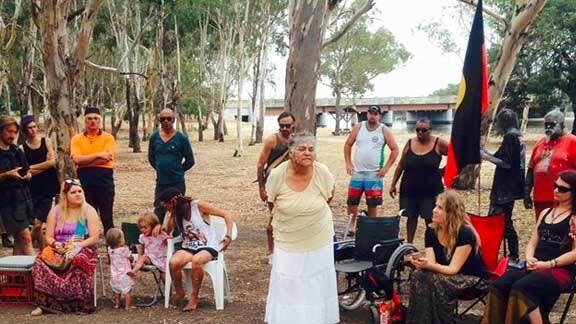Aboriginal activists stand strong at Matagarup

In a victory for Aboriginal activists, the refugee camp at Perth’s Matagarup (Heirisson Island) is standing strong. Despite intimidation from police, the state government and the City of Perth, activists have successfully defended their right to protest, and maintain what they have called a refuge for the “homeless and displaced”.
The camp was established three weeks ago in response to the state Liberal government’s November announcement that it will be closing around 150 remote Aboriginal communities. Premier Colin Barnett initially called the remote communities, most in the Kimberley and Pilbara and home to up to 15,000 people, “economically unviable”. Later, speaking to the ABC, he claimed that the “appalling mistreatment” of children was the reason for the closures.
Prime minister Tony Abbott agreed, in his now infamous remarks on ABC radio on 13 March: “What we can’t do is endlessly subsidise lifestyle choices if those lifestyle choices are not conducive to the kind of full participation in Australian society that everyone should have.”
Nhunda Wadjarri Yamatji man Shaun Harris is an uncle of Julieka Dhu, who recently died in police custody in Port Hedland, and an advocate for ending Aboriginal deaths in custody. He tells Red Flag of the state’s attempt to clear the camp: “They came galloping in on mounted police then they sent the sniffer dogs in. They even brought a mobile prison cell.
“The way they came in was pathetic, ridiculous, just to intimidate us … It was mainly elders, women and children at the site, people who weren’t just squatting for there for fun – they have nowhere else to go.
“They tried to shut it down cause they don’t want an influx of Black people, and wanted to shut it down before it became too much of a massive statement.”
Around 50 police descended on the camp on 13 March.
Two days earlier in the West Australian, a spokesperson for the City of Perth was quoted as saying: “Seems to be more of a political protest on broader state and federal issues, rather than on the needs of homeless.”
The police tried to extinguish the sacred fire in the camp. They failed. It was protected by a group of elders and women, with dozens of other activists supporting the group. After confiscating some tents and a pram, police left, with no arrests or move on notices served. The camp is a testament to the resilience of the activists.
The scandal of community closures
The closure of remote communities, such as the Kimberley town of Oombulgurri, has resulted in increasing homelessness, suicides, greater contact with police, courts and prisons, and more forced removal of children from their parents.
“The state of communities is quite bad, with no thanks to the government. They are extremely neglected. There are multimillion dollar resorts not far away from some of these places, but no running water or ablution blocks in our towns … these are issues that could be addressed now, if they want to”, Harris says.
A 2012 Centre for Conservation Geography study found huge increases in proposed and current mining in the Kimberley. The centre estimated a 500 percent increase in mining activity in the previous ten years. By contrast, the National Audit of Municipal and Essential Services in 2009 found that remote Aboriginal communities regularly fail basic infrastructure and service standards, with only 7 percent of communities meeting the minimum levels of access to services.
The staggering amount of money spent on other ventures by the WA state government highlights the double standards at the heart of the closures, chief among them the massive handouts and subsidies to mining companies. The mining boom may have come to an end, but its spoils have always been earmarked for the rich.
The Barnett government has made it clear that it wants Aboriginal people off the land, both in communities where they live, and in the cities when they protest. With the mining industry still the beating heart of the WA economy, systematic racism and land grabs are vital to sustaining profits.
Similarly, the attempt by the City of Perth to separate the issues of homelessness and political protest at Matagarup is about denying Aboriginal people’s agency, and trying to nip in the bud any potential activity.
For successive WA state governments, remote communities and Aboriginal people more generally have been an obstacle to unbridled capitalist expansion. Concurrent with WA’s new anti-protest laws, it is an unholy trinity of racism, protecting mining interests and a strengthening of the state by criminalising protest, or perhaps more to the point, criminalising Aboriginality.
“Let’s talk about lifestyle choices”, Harris says. “Colin Barnett’s lifestyle choice is desecrating sacred sites, kicking people off their land, putting us in a worse position that what we already are.
“We’re all fed up with this government, with the richest country in the world doing this to the poorest people. It’s just a land grab. And Colin Barnett wants to use the Northern Territory Intervention as his template, but we won’t let him … We need to fight them – that’s the only way we can hold them to account and get justice for our people.”